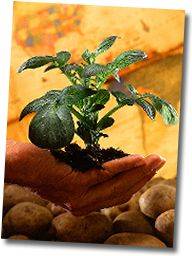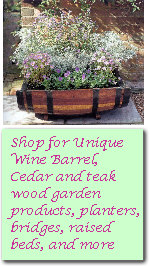The gardener's battle against weeds is continuous. We use many
techniques to control them, yet they still invade our gardens and landscapes.
Plants that become "weedy" are very good
competitors, and they move in with ease from nearby vacant lots, fence rows,
fields, pastures, woodlands, and even our own or the neighbor's garden. The last
source is of special concern. We can accept native plants that are weedy (they
were here first), but what about the plants intentionally grown that become
weeds in our gardens and move into the natural plant communities?
Our concept of what a weed is depends on our perspective.
Bermudagrass serves as a good example. This is a welcome forage in a southern
farm pasture and an excellent lawn and athletic turfgrass in warm areas. On the
other hand, if it becomes established in a bluegrass lawn or spreads into a
flower border, it suddenly becomes "wiregrass" and in need of rigorous
control methods.
Now consider your own perspective if you saw bermudagrass
spreading into a meadow of native grasses and wildflowers. Is it a weed here?
Consider further the fact that bermudagrass was brought to this country from
Asia. It is not a native grass, but is able to compete with and crowd out native
plants. This has happened in many areas of the South and Southwest, and is a
concern to many individuals involved in conservation efforts.
A great many of our garden and landscape plants have been
imported from other parts of the world. In most cases, these plants are poor
competitors and survive only with human assistance. However, other non-natives
are more aggressive and can escape from cultivation. They spread rapidly where
environmentally adapted because the native plants are not able to compete
successfully. Most of us pay little attention to these imports as they
naturalize in our wild areas, but in many areas they have become serious enough
to threaten the stability of the native plant habitats.
Problems with these invasive plants are often the result of a
good intention gone wrong. Bermudagrass is valuable when under control, but a
terrible weed if it escapes.
Kudzu was introduced from the Orient as an ideal soil
stabilizer to protect damaged soils in the South. But this plant can grow 50
feet in a season, smothering every other plant in its path, and is now referred
to as the "green cancer" of the South.
Multiflora rose was brought from Japan and promoted for
widespread planting as a "living fence" for pastures and an ideal food
and shelter source for wildlife. A major control program is now being conducted
against this rank-growing bush.
The succulent garden weed, purslane, was brought from Europe
as a vegetable greens crop. Ailanthus or Tree-of-Heaven, another import,
is a tree very tolerant of poor soil and urban air, but now is naturalized and a
persistent weed.
Other imported ornamental plants gone out of control in parts
of the country include Oriental bittersweet, bamboo, morning-glory, Scotch
broom, bracken fern, foxglove, pampas grass, and Japanese honeysuckle.
As with kudzu and multiflora rose, the problem of escaped
plants can develop when only one aspect (for example, the benefits of soil
stabilization or wildlife conservation) is considered, and not the entire
environmental effect. Plant imports are now much more closely studied to avoid
introducing potential problems, but many of the current problems will expand as
invasive plants are carelessly grown.
Gardeners are called upon to take a personal role in
controlling the spread of invasive plants. Even reputable garden companies will
offer many of these plants, or government agencies will recommend them for
particular purposes, presuming they will be maintained and controlled in the
landscape. As new plants are being considered for the garden, check your
references for warnings about heavy seed production, rank growth, or other weed
characteristics. If the plant does pose a potential problem, avoid it or be
prudent in keeping it under control, particularly if gardening an area near
natural and un-maintained habitats.
![]() Gardeners' Corner
Kids'
Garden
Sustainable Garden
Contact Us
Gardeners' Corner
Kids'
Garden
Sustainable Garden
Contact Us![]()

